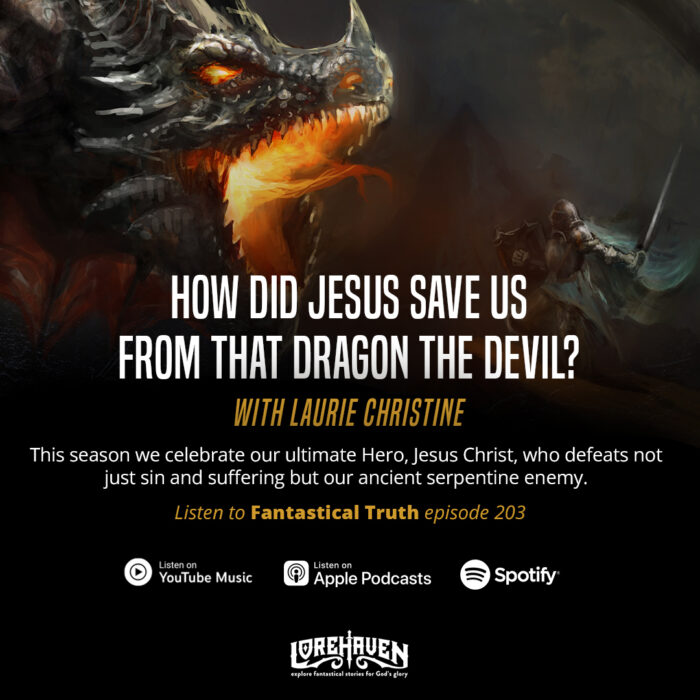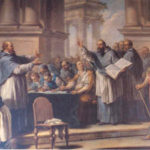What’s Wrong With Allegory?
Why does allegory seem to get a lot of negative press?
Last week the Christian Science Fiction and Fantasy (CSFF) Blog Tour featured The God Hater by Bill Myers. Some reviewers indicated that the allegorical aspects of the story lowered their estimation. That’s not a surprise to me. I’ve run across more and more prejudice against allegory, and I have to ask, Why?
Less than a hundred years ago, the allegory was a somewhat “in” form of literature, and not by Christians. Existentialists like Albert Camus and Franz Kafka wrote allegorical novels as did political satirist George Orwell.
Then along came C. S. Lewis.
 Granted, he maintained that he did not write allegory, but his method of “supposal” (suppose God showed up in a world peopled by talking animals and dwarfs and other such mythical creatures, what form would He take?) lent itself to allegorical elements — though that’s not quite the same thing as an allegory like Animal Farm or The Stranger.
Granted, he maintained that he did not write allegory, but his method of “supposal” (suppose God showed up in a world peopled by talking animals and dwarfs and other such mythical creatures, what form would He take?) lent itself to allegorical elements — though that’s not quite the same thing as an allegory like Animal Farm or The Stranger.
Nevertheless, Lewis, and to a lesser extent J. R. R. Tolkien inspired a number of writers (myself included) to create stories that contain at least the suggestion of allegory. Karen Hancock’s debut novel, Arena, was an especially clear science-fantasy allegory. Her Guardian King series contained allegorical elements — the God figure, Eidon being the most obvious.
Our Friday guest blogger, Donita Paul, incorporates allegorical elements in her fantasy series as does Sharon Hinck (The Sword of Lyric series, soon to be re-released by Marcher Lord Press), Christopher and Allan Miller (the Hunter Brown series, Warner Press), Chuck Black (the Knights of Arrethtrea series, Multnomah Books), and a number of others.
Yet rather than being viewed as an “in” genre, allegory often gets an eye roll and a yawn. It appears in the list of weaknesses, not strengths. I know because I’ve put them in the negative column in a review or two myself.
But why should allegory be considered the ugly step-sister of speculative fiction? More so, why should allegorical elements be frowned upon?
I suspect there are a couple reasons.
One, readers may feel as though they have wised up. They can see through allegory easily and therefore think the story will be predictable.
The ironic thing is, other genres are just as predictable, yet that fact doesn’t seem to be held against them. In murder mysteries, there is little doubt that the detective will, in the end, solve the crime. In romances, there is no doubt that the love interests will conquer the obstacles and come together in the end. The story intrigue does not lie in what happens in the end, but in how it comes about.
I suggest the same thing is true for a speculative story with allegorical elements. Yet too often potential readers are turning up their noses at the very idea of allegory.
A second possibility is that “preachiness” in Christian fiction has become equated with actually having something to say, as if stories should exist for no other purpose than to entertain. Hence allegories or stories with transparent allegorical elements may end up in the preachiness pile because their “message” is apparent.
I’ve heard conference speakers declare that true art has no utilitarian purpose (which is actually another way of saying that it is useless, but I don’t think anyone has spelled that out before). I have long argued that much art, down through time, has served utilitarian purposes (ask any architect if this isn’t so); that fiction is a form of communication and therefore, by its definition, has something to say, writer to reader.
Which means that all fiction is, to a varying degree, “preachy.” Shrek, Tangled, Avatar, The Shack, all these stories made clear thematic statements, some even utilizing allegorical elements, yet without receiving the prejudicial shun: Oh, I don’t read/watch message-driven fiction, and I especially don’t care for allegory!
My third idea, then, as to why allegory has fallen out of fashion, is that it has fallen out of fashion. Since predictable ends aren’t the real problem and all fiction communicates something, the only explanation that makes sense to me is this: notable people began to say how they did not like allegory.
J. R. R. Tolkien was one. He protested that The Lord of the Rings was not an allegory (the popular view at the time was that he was allegorizing World War II). From the introduction to the second edition of the Lord of the Rings: “It is neither allegorical nor topical….I cordially dislike allegory in all its manifestations, and always have done so since I grew old and wary enough to detect its presence.” (from Wikipedia, allegory).
How hard it is for me to hold a differing view from the master, but I do. Detecting the presence of allegory is no different than detecting the presence of a simile, or a character arc, or story conflict. That you see it does not make it bad. The real question ought to be, what does this writer do with it?
Now it’s your turn. What do you think of allegory? And be sure to include the title of the last allegory you’ve read. 😉








































I don’t dislike allegory at all, but feel that it has been overused in Christian fiction. One reason for this, I think, is that Christian fiction is defined by its “message.” Like it or not, we have a hard time calling something “Christian” anymore if there is no evidence of a “Gospel code.” As a result, Christian readers are always looking for this “code.” And allegory has become one of the tools to “encode” our stories.
Interestingly I was just wrestling with this question. A few days a go I finished the two volume version of Bill Hand’s “The Oneprince”. It was very good but the allegorical aspect was so close to the Gospels that I knew exactly what was going to happen (although I did not know the specific details). Since I’ve read so many allegories it took some of the joy out of the book. However, if I had never read an allegory before or was an unbeliever it would have been very powerful.
All books are allegorical to some extent. Some extremely minor and some just the almost word-for-word. Take Michael Warden’s “The Pearlsong Refounded” trilogy. It’s spiritually allegorical but the physical story is something new. Personally I prefer this form of allegory. New story with a Biblical message. I get the spiritual growth and I’m entertained at the same time.
One of the great aspects of the internet is that I rarely have to read a book without reading reviews first. (Sometimes I review books before they are released.) If the review says the book is very allegorical then I’ll probably skip it. I’ve read too many already. The free-market is a wonderful thing.
Steve, I thought I was the only one who had read Michael Warden. 😉 Actually I’ve only read Gideon’s Dawn. I didn’t even know he’d finished the third book.
Michael once said Stephen Donaldson (The Chronicles of Thomas Covenant the Unbeliever) was a big influence on him, as he was on me. I was at first taken aback at how much what Michael was trying to accomplish seemed to mirror what I’m trying to accomplish in The Lore of Efrathah.
I would definitely not call Michael’s work allegory, though it does have some allegorical elements. In some ways, I don’t know how that can be avoided in fantasy. After all, the genre is built on a good/evil conflict. As Christians we are hard pressed to present good absent of God. And as soon as He shows up, people start to cry, Allegory, the dreaded, hated, allegory! (OK, I added a little dramatic embellishment, perhaps. 😉 )
Becky
Becky, Actually book two “Waymaker” is out but he’s working on book three right now. Hopefully it’ll be out soon. I thought the first two books were absolutely brilliant. I do believe though that they are, as I said, allegorical. Not in the storyline, plot or in the physical realm but in the spiritual. If you recall their weapon was the spoken word. Same weapon we have and if I recall Jesus used also. =)
As I’d guessed in advance, it sounds like more readers oppose not allegory itself, but the same allegories, over and over and over … making fiction bland, predictable, artificially message-centered, and myopic.
With all of Scripture’s truths and the world’s imagination source material available to us, why constantly revisit yet another Messiah Allegory to Help You Understand what Jesus Really Did? Yes, we need to preach the Gospel to ourselves, but that includes its various aspects, not the same predictable Jesus-died-for-you motifs.
One allegory that hasn’t been explored, for example, includes the “messiahs” we make up for ourselves, and the deceptive beliefs Christians have about what we’re actually saved from. … Or how about living-under-the-Law-before-the-Messiah allegory (which Kathy Tyers’ Firebird novels explored)? Or what about end-times allegory? The Biblical book of Revelation itself sets that precedent (whether or not the prophecies should also be understood as literal!). So many possibilities …
I recommend Matt Mikalatos’s Imaginary Jesus. Not “allegory” per se, but deals with the issue you mentioned, Stephen.
Yes, I agree there are many topics we could explore using allegory. I don’t think we’ve explored all there is to explore about Jesus coming in the form of man, however.
In reality, I don’t know if I’ve seen a lot of those. Seems maybe The Tower of Geburah might have had a Christ/crucifixion allegory (it’s been a loooonng time since I read that one). But what else? Sharon Hinck? No. Karen Hancock? No. George Bryan Polivka? No. Donita Paul? No. Bryan Davis? No. Maybe Wayne Batson’s Door Within series. I don’t remember clearly, but I think there was a Christ figure that made a sacrifice.
Anyway, I really am wondering where all these allegories are that make people tired of them.
Becky
I don’t dislike allegory as a writing tool – I have story ideas that are built off allegories, myself – but when I come across a purely allegorical book, I tend to be annoyed. I’m not sure why. I guess it’s because it is a story written to tell another story, so there is not as much room for creativity; everything is symbolic of something else.
Pilgrim’s Progress comes to mind. My mother read that to us several times during my childhood, and each time I was more irked that we were reading it again. Now that I’m older, I’ve shaken off some of my resentment about Pilgrim’s Progress, and I can see how an allegory might cause us to think in a different way about the true story behind it, but I still wouldn’t want to write a book that was entirely allegorical – too much pressure to make everything meaningful! 🙂
Allegory… every story has a message and fiction is never pure entertainment. It all comes out of the minds of humans with their own views and beliefs about how things are, and why things are, and how things should be. But the “Christian” author is at a disadvantage in presenting their thoughts in the form of fiction, because everyone assumes a basic understanding of the message before they even open the book. By labeling it Christian there is an automatic bias for or against it dependent on the preference of the reader, and they are biased to read allegory into it based on the fact that it was marketed as Christian. I believe all fiction is allegory because it is the projection of human thoughts- conscious or unconscious- in story form. The advantage for those not labeled “Christian” is that we don’t assume to know their worldview, biases, or family stories to pick out the allegory so easily. Everything in fiction holds symbolic meaning to the mind of the author who wrote it… awareness of the allegorical content is another subject.
Some fiction is different in that the allegory is blatantly allegory. That seems to be the category at issue, but the complaints directed at “Christian” fiction make that distinction not so clear. I enjoy a good story with a lesson, and appreciate when the author is honest and upfront with the fact that a message is exactly what they are delivering. If you prefer to believe you were only entertained and your views of the world have gone unchanged by reading the fiction you believe is allegory-free; then have fun in your fantasy world. I know better.
Last intentionally allegorical book I read was “The Dragon Slayer with a Heavy Heart” by Marcia Powers. A fun educational read.
I tend to agree with Patrick. I do believe most fiction has an allegorical element to it because of the author’s worldview embedded in the story that are telling.
Unfortunately, Christian Fiction will always have an basis against because most readers will be looking for the allegorical elements either to reaffirm their worldview or reject it.
Also, I enjoy a story with a good lesson…but the characters, plot or storyline and theme have to control the novel instead of the allegorical message the author has included.
Funny, I just started a discussion on another Christan Forum asking if Christian authors have more trouble promoting their books than non-Christian. I asked that because I write YA allegory! 🙂 I’ve run across many of the same concerns, questions and presumption. But like you, Becky, I’m not surprised by the reactions.
I asked the question to provoke discussion about how to overcome the presumption placed upon Christian authors. Does it come down to marketing? Taking allegory out of YA? Taking off the title of Christian fiction? Or distancing oneself from Christ and ones beliefs to sell a book?
In the end, I believe, it all comes down to a personal choice. No matter what Christians do, the world will always find a way to be prejudice against us.
I like the scene in Il Postino, in which Mario Ruoppolo asks the great poet, Pablo Neruda, whether the sea, the waves, boats, the sand, the sun, the wind [“et cetera, et cetera, prompts the poet] are all a metaphor for something else… he stumps the poet.
I leave the question whether metaphor=allegory to others… but I think they are a useful tool for studying that which cannot be explained.
I tend not to like allegories that put the Gospels and Christ’s Sacrifice into a new world. The only exceptions to this would be: The Lion, the Witch, and the Wardrobe, which I feel did such an excellent job portraying Christ’s sacrifice that I refuse to try to write that into my world; and Calvin Miller’s The Singer Trilogy, which I like because its a new format.
For the most part, I agree with Steve; Biblical message, new story. I also try to focus on this in my own writing.
I think my question is how we’re defining allegory. I’m not sure I’d call everything on the list such.
I think Kaci has a point: how do we define allegory? When I googled the word, this is the definition I found: a story used to illustrate abstract ideas or principles. When viewed in this light, I think allegories take on a whole new perspective.
I always muddy the waters when I don’t define my terms. When I say “allegory,” I’m referring to more than “a story, poem, or picture that can be interpreted to reveal a hidden meaning, typically a moral or political one” as the Oxford American Dictionary defines it.
As a literary genre, allegory is generally understood to be made up of allegorical parts that combine to create an allegorical whole. Here’s what Wikipedia says:
Works like Donita Paul’s DragonKeeper Chronicles have some allegorical elements (e. g. Wulder equals God, based on his position as Creator of the world, among other things), but that does not mean the stories are allegories.
Writing true allegory is difficult to sustain, and few authors, from what I’ve read, are actually trying to write allegories.
I believe Chuck Black, author of the Knights of Arrethtrae series stated in the first book that he was writing allegory to feature character qualities believers need to foster (or something like that 😉 It’s been a while since I read it. OK, here’s the quote: “[This series] presents biblical principles allegorically. Each book teaches about virtues and vices conveyed through the truth of God’s Word. Sir Kendrick and the Castle of Bel Lione teaches about loyalty, forgiveness, foolishness, and rebellion.”)
I wouldn’t call these books allegories. Apparently his Kingdom Series was: “the Kingdom Series allegory … characters and events are based on people and events taken directly from Scripture.” I surmise there is a one to one correspondence, and that’s the type of story I’m referring to as allegory.
Becky
This discussion is great. As I read through the comments, a couple things came to mind (beside the need to define my terms. 😉 )
First, Mike Duran said:
I thought about this for some time. I suspect we Christians are more likely taking our cue from Scripture where symbolism is prevalent, whether in parables or in historical types or in Christ’s own metaphors (“I Am” the door, the way, the good Shepherd, living water, bread, the vine, light, and so on). Since Scripture alerts us to “hidden meanings,” I think we as readers may be expectant and watchful, and as writers, imitators.
Interestingly, I’m doing a series on symbolism on my editing blog, particularly looking at Christian fiction in parts 2 and 3, so this is somewhat on my mind of late.
Becky
I forgot I posted here. Oopsie.
Morgan – I think Kaci has a point: how do we define allegory? When I googled the word, this is the definition I found: a story used to illustrate abstract ideas or principles. When viewed in this light, I think allegories take on a whole new perspective.
Becky – I always muddy the waters when I don’t define my terms.
And moderating for six years ensured that’s the first question I’m always going to ask.
When I say “allegory,” I’m referring to more than “a story, poem, or picture that can be interpreted to reveal a hidden meaning, typically a moral or political one” as the Oxford American Dictionary defines it.
As a literary genre, allegory is generally understood to be made up of allegorical parts that combine to create an allegorical whole. Here’s what Wikipedia says:
“Allegory is a figurative mode of representation conveying meaning other than the literal. Allegory communicates its message by means of symbolic figures, actions or symbolic representation. … Simply put, an allegory is a device used to present an idea, principle or meaning, which can be presented in literary form, such as a poem or novel, or in visual form, such as in painting or sculpture. As a literary device, an allegory in its most general sense is an extended metaphor. As an artistic device, an allegory is a visual symbolic representation. An example of a simple visual allegory is the image of the grim reaper. Viewers understand that the image of the grim reaper is a symbolic representation of death. Nevertheless, images and fictions with several possible interpretations are not allegories in the true sense. Furthermore, not every fiction with general application is an allegory. (emphases added)”
My primary reason in asking is because several titles listed, I wouldn’t think of as allegory: Donita Paul’s books and Karen Hancock’s “Legends of the Guardian King” among them.
Works like Donita Paul’s DragonKeeper Chronicles have some allegorical elements (e. g. Wulder equals God, based on his position as Creator of the world, among other things), but that does not mean the stories are allegories.
Writing true allegory is difficult to sustain, and few authors, from what I’ve read, are actually trying to write allegories.
Now this point I’d agree on, and that’s why I was asking.
I thought about this for some time. I suspect we Christians are more likely taking our cue from Scripture where symbolism is prevalent, whether in parables or in historical types or in Christ’s own metaphors (“I Am” the door, the way, the good Shepherd, living water, bread, the vine, light, and so on). Since Scripture alerts us to “hidden meanings,” I think we as readers may be expectant and watchful, and as writers, imitators.
I’m just not sure that everything in Scripture was supposed to be an allegory. It’s a completely different subject, but the reason so many word pictures exist is mostly because the infinite God of the universe is trying to talk in a language simple and encompassing enough for us humans to understand.
But why should allegory be considered the ugly step-sister of speculative fiction? More so, why should allegorical elements be frowned upon?
I suspect there are a couple reasons.
One, readers may feel as though they have wised up. They can see through allegory easily and therefore think the story will be predictable…A second possibility is that “preachiness” in Christian fiction has become equated with actually having something to say, as if stories should exist for no other purpose than to entertain. Hence allegories or stories with transparent allegorical elements may end up in the preachiness pile because their “message” is apparent…My third idea, then, as to why allegory has fallen out of fashion, is that it has fallen out of fashion.
I think a few other things are happening too:
1. People who don’t really understand what allegory is, much less how to do it.
2. People trying to copy Lewis, Tolkien, Bunyan, or other classics. And I think that’s the biggest one. I cannot, nor will I ever be, nor do I want to be, Tolkien, Lewis, or anyone else. It’s not possible, and I’m setting myself up for failure if I try to be anyone but Kaci Hill. Period, end discussion. The best I can give you is ME. (End rant. Maybe that’s a blog topic.)
3. As a result of 1&2, it…does…not…work. It goes badly.
4. People rehash the same symbols until the poor things are so worn out they’ve lost all possibility of the shine they once possessed. Yes, Jesus was portrayed as a lion, a lamb, a suffering Savior, and a conquering king. Yes, Jesus is the Bridegroom, we are the Bride. But there’s fifty thousand other ways Jesus tried to describe himself, and we’ve fixated on two or three.
5. And because of the previous 4, yes, people got sick of it. For the same reason we all mock (I mock) chick flicks, horror movies, and slapstick comedy.
6. And then there’s always the Society of the Nonconformists Gold Card Members…
And now I’m talking too much.
Snap, I killed the formatting. Gar. Edit, edit, edit!!!!
I’ve read all of this, including most of the comments, with interest.
One question about the Wikipedia definition, which seems to use one possible meaning as the main criterion. Isn’t it always, or almost always, possible to see another meaning?
I should have said, “one meaning” as the main criterion. Sorry.
(Forgive me as I attempt some of this HTML formatting…)
I’m late to the party, but I found the post and comments fascinating. Especially since there are strong allegorical elements to my WIPs.
Oops. Nope, did that wrong. Boo. Sorry for my HTML issues.